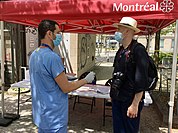
Back جائحة فيروس كورونا في كيبك Arabic Pandemia de COVID-19 en Quebec Spanish Pandémie de Covid-19 au Québec French Pandemi Covid-19 di Quebec ID Пандемија ковида 19 у Квебеку Serbian
| COVID-19 pandemic in Quebec | |
|---|---|
(clockwise from top)
| |
| Disease | COVID-19 |
| Virus strain | SARS-CoV-2 |
| Location | Quebec, Canada |
| First outbreak | Wuhan, Hubei, China |
| Index case | Montreal |
| Arrival date | February 27, 2020[1] |
| Date | April 11, 2023 |
| Confirmed cases | 1,165,052[a][2] |
| Hospitalized cases | 1,141 |
Deaths | 17,696[2] |
| Fatality rate | 1.52% |
| Vaccinations |
|
| Government website | |
| Quebec Government COVID-19 data in Quebec (French only) | |
The COVID-19 pandemic in Quebec was part of the global pandemic of coronavirus disease 2019 (COVID-19), a novel infectious disease caused by severe acute respiratory syndrome coronavirus 2 (SARS-CoV-2).
Until 2021, Quebec had reported the highest number of COVID-19 cases in Canada, eventually overtaken by the neighbouring province of Ontario. However, Quebec still reports both the highest number and the highest rate of deaths in the country, largely due to poor conditions in long-term care homes, with around 80% of deaths in the first wave occurring in centres d'hébergement de soins de longue durée (CHSLDs) and résidences privée pour aînés (RPAs).[2]
Over the course of the first two years of the pandemic, Quebec underwent four lockdowns, corresponding to the four major waves of the virus. COVID-19 propagation tended to follow a seasonal pattern of intensification in the colder months (September to March), resulting in the tightening of measures, and reduction in the warmer months (April to August), resulting in the relaxation of measures. The purported goal of the lockdowns was to lessen the burden on the already overloaded healthcare system by reducing severe COVID-19 cases, also known more colloquially as the flatten the curve (aplatir la courbe) strategy. In total, the largest population centres of the province were under significant restrictions, which generally comprised the closure of non-essential businesses and the banning of most indoor gatherings, for 15 months. Many major events were cancelled for both 2020 and 2021, including the Formula One Canadian Grand Prix in Montreal. Controversially, a curfew was put in place province-wide from January to June 2021 and for the first two weeks of January 2022, despite concerns about the effectiveness of curfews to reduce cases.[4][5] All measures were dropped in the second quarter of 2022, with the provincial state of emergency ending on June 1. Though Quebec took a comparatively harsh approach to public health restrictions, the provincial government, led by Premier François Legault, emphasized keeping schools open for as long as possible, despite initial pushback citing superspreader events.[6][7][8] As a result, schools were fully remote for a total of only about 145 days, compared to 220 days in Ontario.[9]
The vaccination campaign started in December 2020 and was rolled out over the next few months in descending order from the most vulnerable groups to the least vulnerable. In May 2021, vaccination against COVID-19 was extended to all adults in Quebec. By the end of that year, Quebec had a vaccination rate among the highest in the developed world, with over 80% of the population having at least one dose. Nonetheless, in September 2021 the province was the first in Canada to institute a vaccine passport for places considered to be high-risk, including restaurants, theatres, gyms, and bars. The vaccine passport was retired in March 2022.
From the start of the pandemic to January 2022, announcements about the current epidemiological situation and related public health measures took place every weekday in a press conference hosted by Premier Legault, the Minister of Health, and the National Public Health Director. The latter, Horacio Arruda, became the well-known and well-liked figurehead of the COVID-19 pandemic in Quebec[10] until his resignation in January 2022. Financial aid programs, most of which ended in 2022, were also announced early in the pandemic for sectors that were not already covered by federal financial aid programs and that were particularly affected by pandemic closures, such as public transportation, restaurants, hotels, and theatres.
- ^ "Ligne du temps COVID-19 au Québec". INSPQ. Gouvernement du Québec. October 5, 2022.
- ^ a b c "Données COVID-19 au Québec". INSPQ.
- ^ "Données de vaccination contre la COVID-19 au Québec". INSPQ (in French). Gouvernement. Retrieved March 19, 2021.
- ^ Cite error: The named reference
curfew-1was invoked but never defined (see the help page). - ^ Cite error: The named reference
curfew-2was invoked but never defined (see the help page). - ^ ICI.Radio-Canada.ca, Zone Politique- (April 16, 2020). "Le gouvernement Legault divisé sur la réouverture des écoles | Coronavirus" [The Legault government divided on the reopening of schools]. Radio-Canada.ca (in Canadian French). Retrieved May 11, 2020.
- ^ Meagher, John (May 1, 2020). "Quebec English school boards say they will decide when to reopen". Montreal Gazette.
- ^ Fahmy, Gabrielle (November 20, 2020). "The exam conundrum: Two Montreal schools plan finals in person, but students protest". CTV News.
- ^ Han, Ji Yoon; Breton, Charles (February 1, 2022). "Have provinces put schools first during COVID?". Policy Options. Archived from the original on May 12, 2023.
- ^ Fauteux, Nicolas (April 28, 2020). "Tout ce que vous devez savoir sur le docteur Horacio Arruda". 7 Jours (in Canadian French). Retrieved June 25, 2023.
Cite error: There are <ref group=lower-alpha> tags or {{efn}} templates on this page, but the references will not show without a {{reflist|group=lower-alpha}} template or {{notelist}} template (see the help page).
© MMXXIII Rich X Search. We shall prevail. All rights reserved. Rich X Search




